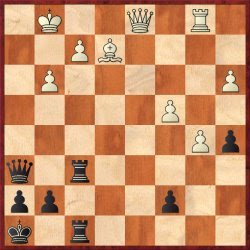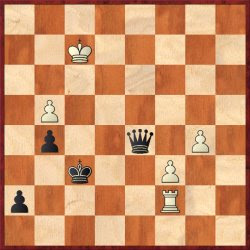20.6.08
Olala Chess School Advertisement
This is the chance to make the right move and improve quickly!
Just subscribe to :
I Masters of Olalachess Academy Training Camp
1-7 September 2008
Salou (Spain)
New method of dynamic chess teaching suitable for everybody who wants to improve, enjoys more his games and has good results!
What do we offer:
- The sessions will be conducted in 6h blocks with two experienced Grandmasters
GM Arthur Kogan GM Alexander Delchev
+ This program is designed for all chess levels and is individually structured to fulfill the needs of all participants in order to achieve optimal results!
1. Level: Beginners: - 1800 rating
2. Level 1800-2000 rating
3. Level 2000-2200 rating
4. Level 2200+ rating
+Special training for youngsters will be included.
+The camp will provide not only a complete chess experience, but will also include hiking, sports etc. and will be an excellent vacation in one of the most beautiful places in Spain.
The lectures will be conducted in English and Spanish even thought the trainers are fluent in Russian, Bulgarian, Hebrew, Croatian…Due to high demand the number of openings are limited.
For more Information you can contact us by email: tanipl_77@yahoo.com
Call us: (0034 ) 635 943271 / 977 22 0281
Web: www.masters.olalachess.com
19.6.08
13.6.08
When Win is a Must
IX EICC Plovdiv BUL (9), 30.04.2008
1.g3 Before this game I had a 50% result, and the calculations showed that I either need a win it to conclude my final GM norm (actually fourth GM norms, but "thanks" to FIDE's help to deal with clearing the things about one of my previous norms) I needed or to win this encounter, or to play for a draw and to try in my final games. I chose the first option. 1...e5 2.c4 Nf6 3.Bg2 d5 4.cxd5 Nxd5 5.Nc3 Nb6 6.Nf3 Nc6 7.0–0 Be7 8.a3 0–0 9.b4 Be6 10.d3 f6 Minasian's opening repertoire is wide, but usually he does not count on big opening advantage. Extreme fighter, he is happy a tiny advantage, and relys on his excellent endgame technique. By the way he was the last USSR champion. 11.Be3
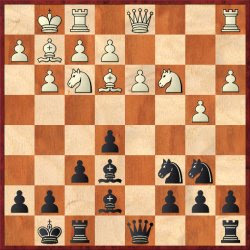 Here my exact opening knowledge ended. But I was familiar with the arising position (reversed Dragon line), similiar position may appear from Pirc Defense as well (again with reversed colours.) 11...a5 It is good to challenge White's pawn formation and get control over the c5 square. 12.b5 Nd4 13.Bxd4 exd4 14.Na4 Qd7 Black is not afraid of doubling his panws on the b line. I know this idea from GM Evgeny Ermenkov. 15.Qc2 [15.Nxb6 cxb6 16.Qa4 Bc5 17.Nd2 Qf7 18.Rab1 Qe7 19.Nb3 Bxb3 20.Qxb3+ Kh8 Similar position could arrise in the game too. I consider it better for Black who can create a step-by-step attack against White's king. In the meanwhile the bishop on c5 cements the whole Queen's flank. 21.a4 Rac8 22.Bf3 Rc7 23.Rfc1 f5ѓ Ѕ–Ѕ Smejkal,L-Biolek,R (2425)/Czechia 1997/EXT 1999 (33)] 15...Rad8 [15...Rfd8 Is possible, but I wanted to use the rook on f8 later and to remove his collegue from the unpleasant X-raying of the fianchetoed bishop. 16.Rfc1 Rac8 17.Nc5 Bxc5 18.Qxc5 Na4 19.Qc2 Qxb5 20.Rab1 Qc6 21.Qxc6 bxc6 22.Rxc6= Ѕ–Ѕ Mastrovasilis,A (2533)-Kapnisis,S (2421)/Salonica 2006/CBM 115 ext (36)] 16.Rfb1 [16.Rfc1 Qxb5 17.Nxb6 is not enough- 17...cxb6 18.Rcb1 Qa6 with Black's advantage Ѕ–Ѕ Weindl,A (2380)-Apicella,M (2410)/Biel 1990/EXT 2000 (49)] 16...Nxa4 17.Qxa4 b6 18.Rc1 Bc5 19.Nd2 f5
Here my exact opening knowledge ended. But I was familiar with the arising position (reversed Dragon line), similiar position may appear from Pirc Defense as well (again with reversed colours.) 11...a5 It is good to challenge White's pawn formation and get control over the c5 square. 12.b5 Nd4 13.Bxd4 exd4 14.Na4 Qd7 Black is not afraid of doubling his panws on the b line. I know this idea from GM Evgeny Ermenkov. 15.Qc2 [15.Nxb6 cxb6 16.Qa4 Bc5 17.Nd2 Qf7 18.Rab1 Qe7 19.Nb3 Bxb3 20.Qxb3+ Kh8 Similar position could arrise in the game too. I consider it better for Black who can create a step-by-step attack against White's king. In the meanwhile the bishop on c5 cements the whole Queen's flank. 21.a4 Rac8 22.Bf3 Rc7 23.Rfc1 f5ѓ Ѕ–Ѕ Smejkal,L-Biolek,R (2425)/Czechia 1997/EXT 1999 (33)] 15...Rad8 [15...Rfd8 Is possible, but I wanted to use the rook on f8 later and to remove his collegue from the unpleasant X-raying of the fianchetoed bishop. 16.Rfc1 Rac8 17.Nc5 Bxc5 18.Qxc5 Na4 19.Qc2 Qxb5 20.Rab1 Qc6 21.Qxc6 bxc6 22.Rxc6= Ѕ–Ѕ Mastrovasilis,A (2533)-Kapnisis,S (2421)/Salonica 2006/CBM 115 ext (36)] 16.Rfb1 [16.Rfc1 Qxb5 17.Nxb6 is not enough- 17...cxb6 18.Rcb1 Qa6 with Black's advantage Ѕ–Ѕ Weindl,A (2380)-Apicella,M (2410)/Biel 1990/EXT 2000 (49)] 16...Nxa4 17.Qxa4 b6 18.Rc1 Bc5 19.Nd2 f5
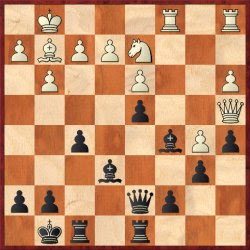 20.Rxc5!? Typical exchange sacrifice. White deprives me of the bishop pair, and counts on the weak pawns that Black will have now. Nevertheless, an exchange is an exchange, and I was happy with the course of the game. Alternatively: [20.Nb3 Bxb3 21.Qxb3+ Kh8 22.Bc6 Qe7 23.Bf3 f4і would give Black initiative thanks to the rook-lifts on the sixth rank, and ooposite-coloured bishops.] 20...bxc5 21.Rc1 A good move. White developes all his pieces before collecting the pawns. [21.Qxa5 Qe7 22.Qa4 f4 with initiative] 21...Qe7 22.Qc2 Bf7 23.Bf3 Probably the correct idea is to liquadate to an endgame with: [23.Nc4!?
20.Rxc5!? Typical exchange sacrifice. White deprives me of the bishop pair, and counts on the weak pawns that Black will have now. Nevertheless, an exchange is an exchange, and I was happy with the course of the game. Alternatively: [20.Nb3 Bxb3 21.Qxb3+ Kh8 22.Bc6 Qe7 23.Bf3 f4і would give Black initiative thanks to the rook-lifts on the sixth rank, and ooposite-coloured bishops.] 20...bxc5 21.Rc1 A good move. White developes all his pieces before collecting the pawns. [21.Qxa5 Qe7 22.Qa4 f4 with initiative] 21...Qe7 22.Qc2 Bf7 23.Bf3 Probably the correct idea is to liquadate to an endgame with: [23.Nc4!?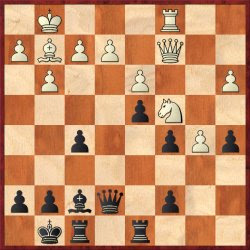 23...Bxc4 24.Qxc4+ Kh8 25.Bf3 g5!? 26.Qxc5 Qxc5 27.Rxc5 g4 with unclear endgame] 23...Qg5 Hitting the knight on d2, and preparing both f5-f4 push and Bf7-h5 exchange of the important defender. 24.Bc6 [24.Nc4 Bd5 25.Nxa5 Bxf3 26.exf3 f4 with initiative- Black needs open lines for the rooks.] 24...Qh6 [24...Kh8!? with idea Bf7-d5.] 25.Nb3 Finally White starts to pick up the pawns, but I am ready for attack. 25...c4! The pawn is doomed anyway, it is nice to free some energy for the collegue on d file. 26.dxc4 f4 27.Nc5 [27.Bf3 fxg3 28.hxg3 Bg6 29.Qd1 d3‚] 27...fxg3 28.hxg3 Bg6 29.Qd1 I was already considering the sacrifices on f2. For example: [29.Be4?
23...Bxc4 24.Qxc4+ Kh8 25.Bf3 g5!? 26.Qxc5 Qxc5 27.Rxc5 g4 with unclear endgame] 23...Qg5 Hitting the knight on d2, and preparing both f5-f4 push and Bf7-h5 exchange of the important defender. 24.Bc6 [24.Nc4 Bd5 25.Nxa5 Bxf3 26.exf3 f4 with initiative- Black needs open lines for the rooks.] 24...Qh6 [24...Kh8!? with idea Bf7-d5.] 25.Nb3 Finally White starts to pick up the pawns, but I am ready for attack. 25...c4! The pawn is doomed anyway, it is nice to free some energy for the collegue on d file. 26.dxc4 f4 27.Nc5 [27.Bf3 fxg3 28.hxg3 Bg6 29.Qd1 d3‚] 27...fxg3 28.hxg3 Bg6 29.Qd1 I was already considering the sacrifices on f2. For example: [29.Be4?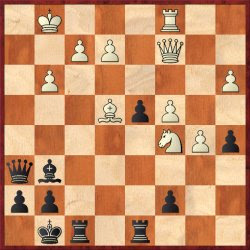 29...Rxf2! 30.Kxf2 Qh2+ 31.Ke1 Qxg3+ 32.Kd1 Qg1+ 33.Kd2 Qe3+ 34.Kd1 Rf8 35.Qd2 Bxe4 36.Nxe4 (36.Qxe3 Rf1+ 37.Kd2 dxe3+ 38.Kxe3 Rxc1) 36...Qxe4–+ Obviously Minasian saw that option too, and avoided it.] 29...Rd6 My opponent was already in serious time-pressure. Here I spend some time on calculating the f2 capture, but could not find a clear-cut win. Still there was: [29...Rxf2 30.Kxf2 Qh2+ 31.Kf1 Qxg3 32.Qe1 Qh3+ 33.Kg1 Qe3+ 34.Kh1 Qh6+ 35.Kg2 Qg5+ 36.Qg3 Qxc5 with huge advantage] 30.Bd5+ Kh8 31.Ne6? White's position is difficult but this loses on the spot. I felt that win is here, and tried to foresee the forced winning line for some 15 (!) minutes. In vain, my nervousness prevailed. Finally, I found a solid winning line and went for it. 31...Be4
29...Rxf2! 30.Kxf2 Qh2+ 31.Ke1 Qxg3+ 32.Kd1 Qg1+ 33.Kd2 Qe3+ 34.Kd1 Rf8 35.Qd2 Bxe4 36.Nxe4 (36.Qxe3 Rf1+ 37.Kd2 dxe3+ 38.Kxe3 Rxc1) 36...Qxe4–+ Obviously Minasian saw that option too, and avoided it.] 29...Rd6 My opponent was already in serious time-pressure. Here I spend some time on calculating the f2 capture, but could not find a clear-cut win. Still there was: [29...Rxf2 30.Kxf2 Qh2+ 31.Kf1 Qxg3 32.Qe1 Qh3+ 33.Kg1 Qe3+ 34.Kh1 Qh6+ 35.Kg2 Qg5+ 36.Qg3 Qxc5 with huge advantage] 30.Bd5+ Kh8 31.Ne6? White's position is difficult but this loses on the spot. I felt that win is here, and tried to foresee the forced winning line for some 15 (!) minutes. In vain, my nervousness prevailed. Finally, I found a solid winning line and went for it. 31...Be4 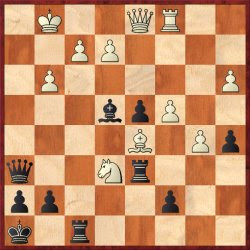 A beautiful win would be: [31...Rxe6! 32.Bxe6 Be4 33.f3 Qe3+ 34.Kg2
A beautiful win would be: [31...Rxe6! 32.Bxe6 Be4 33.f3 Qe3+ 34.Kg2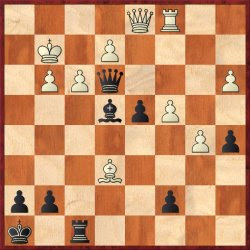 a) if 34.Kh2 Qf2+ 35.Kh1 (35.Kh3 Rf6 36.Qg1 Rh6+ 37.Kg4 Qxe2 and mate follows soon.) 35...Rxf3–+; b) 34.Kf1 Bxf3 35.exf3 Rxf3+ leads to mate as well; 34...d3!! I saw this one but was afraid that something might go wrong. 35.fxe4 Rf2+ 36.Kh3 Qh6+ 37.Kg4 Qxe6+ 38.Kh4 Qh6+ 39.Kg4 Qg6+ 40.Kh4 Rh2#] 32.Bxe4 Rxe6 33.Bf3 d3! This is the idea that I found safer. Now White's position collapses. 34.Rb1 dxe2 35.Bxe2 Ref6
a) if 34.Kh2 Qf2+ 35.Kh1 (35.Kh3 Rf6 36.Qg1 Rh6+ 37.Kg4 Qxe2 and mate follows soon.) 35...Rxf3–+; b) 34.Kf1 Bxf3 35.exf3 Rxf3+ leads to mate as well; 34...d3!! I saw this one but was afraid that something might go wrong. 35.fxe4 Rf2+ 36.Kh3 Qh6+ 37.Kg4 Qxe6+ 38.Kh4 Qh6+ 39.Kg4 Qg6+ 40.Kh4 Rh2#] 32.Bxe4 Rxe6 33.Bf3 d3! This is the idea that I found safer. Now White's position collapses. 34.Rb1 dxe2 35.Bxe2 Ref610.6.08
Superb Technique
9th European Individual Ch (w) round 3 Plovdiv BUL (3.11), 23.04.2008
1.d4 d5 2.c4 e6 3.Nf3 c6 4.Qc2 Nf6 5.Bg5 h6 6.Bh4 dxc4 7.Qxc4 b5 8.Qc2 Bb7 9.e3 Nbd7 10.Nbd2 Rc8 11.Be2 a6 12.a4 Be7 13.0–0
 13...b4N According to Eti this move is a novelty. She has experience in the position from her two encounters against top player Malakhov: [13...0–0 14.Rfd1 (14.Bxf6 Bxf6 15.Ne4 Be7 16.Nc5 Nxc5 17.dxc5 Qc7 18.Nd4 Rfd8 19.Bf3 Bf6 20.Rfd1 Rd7 21.b4 Rcd8 22.axb5 axb5 23.Qe4 g6 24.g3 Bg7 25.g4 Qc8 26.Kg2 Rd5 27.Rab1 Qc7 28.Qc2 R5d7 29.Nb3 Rxd1 30.Rxd1 Rxd1 31.Qxd1 Bc3 32.Qd6 Qxd6 33.cxd6 Bxb4 34.d7 Be7 35.Na5 Ba8 36.Bxc6 Bd8 37.Bxa8 Ѕ–Ѕ Stefanova,A (2489)-Malakhov,V (2682)/Solin 2006/CBM 116) 14...c5 15.d5 Nxd5 16.Bxe7 Qxe7 17.axb5 Nb4 18.Qc3 axb5 19.Bxb5 Nb6 20.Ra7 Rc7 21.e4 Nc8 22.Ra5 Nd6 23.Bd3 Nxd3 24.Qxd3 Rd8 25.e5 Ne4 26.Qe2 Rcd7 27.Raa1 Nxd2 28.Rxd2 Rxd2 29.Nxd2
13...b4N According to Eti this move is a novelty. She has experience in the position from her two encounters against top player Malakhov: [13...0–0 14.Rfd1 (14.Bxf6 Bxf6 15.Ne4 Be7 16.Nc5 Nxc5 17.dxc5 Qc7 18.Nd4 Rfd8 19.Bf3 Bf6 20.Rfd1 Rd7 21.b4 Rcd8 22.axb5 axb5 23.Qe4 g6 24.g3 Bg7 25.g4 Qc8 26.Kg2 Rd5 27.Rab1 Qc7 28.Qc2 R5d7 29.Nb3 Rxd1 30.Rxd1 Rxd1 31.Qxd1 Bc3 32.Qd6 Qxd6 33.cxd6 Bxb4 34.d7 Be7 35.Na5 Ba8 36.Bxc6 Bd8 37.Bxa8 Ѕ–Ѕ Stefanova,A (2489)-Malakhov,V (2682)/Solin 2006/CBM 116) 14...c5 15.d5 Nxd5 16.Bxe7 Qxe7 17.axb5 Nb4 18.Qc3 axb5 19.Bxb5 Nb6 20.Ra7 Rc7 21.e4 Nc8 22.Ra5 Nd6 23.Bd3 Nxd3 24.Qxd3 Rd8 25.e5 Ne4 26.Qe2 Rcd7 27.Raa1 Nxd2 28.Rxd2 Rxd2 29.Nxd2 29...Bxg2 30.Kxg2 Qg5+ 31.Kf1 Qxd2 32.Qxd2 Rxd2 33.Ra8+ Kh7 34.Rc8 Rd5 35.f4 g5 36.Rc7 Kg6 0–1 Stefanova,A (2494)-Malakhov,V (2670)/Benidorm 2005/CBM 109 ext] 14.Bxf6 Nxf6 15.Nb3І c5 16.Nxc5 [16.dxc5!? is probably more exact.] 16...Qc7 [16...Ne4!?] 17.Qd2 Bxc5 18.dxc5 Qxc5 19.Rfc1 Qe7 20.Rxc8+ Bxc8 21.Ne5± Bb7 22.a5 0–0 23.Nd3 b3
29...Bxg2 30.Kxg2 Qg5+ 31.Kf1 Qxd2 32.Qxd2 Rxd2 33.Ra8+ Kh7 34.Rc8 Rd5 35.f4 g5 36.Rc7 Kg6 0–1 Stefanova,A (2494)-Malakhov,V (2670)/Benidorm 2005/CBM 109 ext] 14.Bxf6 Nxf6 15.Nb3І c5 16.Nxc5 [16.dxc5!? is probably more exact.] 16...Qc7 [16...Ne4!?] 17.Qd2 Bxc5 18.dxc5 Qxc5 19.Rfc1 Qe7 20.Rxc8+ Bxc8 21.Ne5± Bb7 22.a5 0–0 23.Nd3 b3 24.Qb4! The arising endgame is technically won-Black has too may weaknesses on the Queen's flank. 24...Qxb4 25.Nxb4 Ra8 26.Ra3 Rc8 27.f3 Rc5 28.e4 Excluding the bishop out of the game. Stefanova's technique is superb. 28...Nd7 29.Kf2 Kf8 30.Ke3 Rh5 31.Nxa6 Rxh2 32.Nc7 Rxg2 33.a6 Bc6 34.a7 Ke7 35.Rxb3 f5 36.Bb5 e5 37.exf5 1–0
24.Qb4! The arising endgame is technically won-Black has too may weaknesses on the Queen's flank. 24...Qxb4 25.Nxb4 Ra8 26.Ra3 Rc8 27.f3 Rc5 28.e4 Excluding the bishop out of the game. Stefanova's technique is superb. 28...Nd7 29.Kf2 Kf8 30.Ke3 Rh5 31.Nxa6 Rxh2 32.Nc7 Rxg2 33.a6 Bc6 34.a7 Ke7 35.Rxb3 f5 36.Bb5 e5 37.exf5 1–0
9.6.08
Test Yorself 9
 1.Ke6 Bxd8 [1...Rf7 2.Kxf7 Bxd8 3.Rd5 Bf6 4.Ke6+-] 2.f6+ Kh6 3.Rxh5+ Kg6 4.Rg5+ Kxg5 5.fxg7 1–0
1.Ke6 Bxd8 [1...Rf7 2.Kxf7 Bxd8 3.Rd5 Bf6 4.Ke6+-] 2.f6+ Kh6 3.Rxh5+ Kg6 4.Rg5+ Kxg5 5.fxg7 1–06.6.08
Chess for Everyone
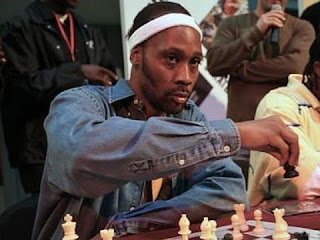 Една от най-култовите хип-хоп формации - Wu-Tang Clan направиха доста интересен скок в кариерата си, след като решиха да се насочат към шахмата.
Една от най-култовите хип-хоп формации - Wu-Tang Clan направиха доста интересен скок в кариерата си, след като решиха да се насочат към шахмата.Основателят на клана RZA създаде първата в света виртуална социална мрежа, в която се общува и играе на шах - Wu-Chess, като за целта рапарът е пръснал 48 млн. долара.
Парите от регистрацията в сайта ще отиват за развитието на Hip-Hop Chess Foundation - организация, която "използва шахмата, музиката и бойните изкуства за противопоставяне срещу насилието и за обединение на хората".
Информация от actualno.com
4.6.08
Perfect Preparation
Nepomniachtchi,Ian (2634) - Sulashvili,Malkhaz (2491) [B14]
9th European Individual Ch (m) round 6 Plovdiv BUL (6.75), 26.04.2008
1.e4 c6 2.d4 d5 3.exd5 cxd5 4.c4 Nf6 5.Nc3 e6 6.Nf3 Bb4 7.cxd5 Nxd5 8.Qc2 Nc6 9.Bd3 Ba5 10.a3 Nxc3 11.bxc3 Nxd4 12.Nxd4 Qxd4 13.Bb5+ Bd7 14.0–0 Qd5 15.c4 Qf5 16.Bxd7+ Kxd7 17.Qb3 b6 18.Rd1+ Ke7 19.a4 Rhd8 20.Ba3+ Kf6 21.Bd6 g5 22.Qb2+ Kg6 23.Ra3 e5
 [23...g4 Is the famous game from the previous EICC. Let me remind you that Vladimir Potkin is Nepomniachtchi's trainer, so the young Russian player is deep into the position. 24.h3 h5 25.Rg3 f6 26.hxg4 hxg4 27.Rd4 Kf7 28.c5 Rg8 29.Rf4 Qg6 30.Rgxg4 Qh6 31.Qb5 Rad8 32.Qc6 1–0 Tkachiev,V (2652)-Potkin,V (2593)/Dresden 2007/CBM 118] 24.Qe2 f6
[23...g4 Is the famous game from the previous EICC. Let me remind you that Vladimir Potkin is Nepomniachtchi's trainer, so the young Russian player is deep into the position. 24.h3 h5 25.Rg3 f6 26.hxg4 hxg4 27.Rd4 Kf7 28.c5 Rg8 29.Rf4 Qg6 30.Rgxg4 Qh6 31.Qb5 Rad8 32.Qc6 1–0 Tkachiev,V (2652)-Potkin,V (2593)/Dresden 2007/CBM 118] 24.Qe2 f6
 25.h4N
25.h4N Nepomniachtchi did his homework. [25.Rad3 Rac8 26.Rd5 Re8 27.g4 Qf4 28.Qd3+ Kg7 29.Bxe5 Qxg4+ 30.Kh1 Rxe5 31.Rd7+ Kf8 32.Rxh7 Qf5 33.Qxf5 Rxf5 34.Rh8+ Kf7 35.Rxc8 Rxf2 36.Rc7+ Kg6 37.Rxa7 Rc2 38.Rc7 Bd2 39.Rc6 Bf4 40.Rxb6 Rxh2+ 41.Kg1 Ra2 42.Rb3 Rxa4 43.Rc3 Ra5 44.Rc2 Ѕ–Ѕ Nepomniachtchi,I (2600)-Rodshtein,M (2614)/Moscow RUS 2008/The Week in Chess 694] 25...g4 26.Rg3 h5 27.f3 Qf4 28.Kh2 Rac8 29.fxg4
Nepomniachtchi did his homework. [25.Rad3 Rac8 26.Rd5 Re8 27.g4 Qf4 28.Qd3+ Kg7 29.Bxe5 Qxg4+ 30.Kh1 Rxe5 31.Rd7+ Kf8 32.Rxh7 Qf5 33.Qxf5 Rxf5 34.Rh8+ Kf7 35.Rxc8 Rxf2 36.Rc7+ Kg6 37.Rxa7 Rc2 38.Rc7 Bd2 39.Rc6 Bf4 40.Rxb6 Rxh2+ 41.Kg1 Ra2 42.Rb3 Rxa4 43.Rc3 Ra5 44.Rc2 Ѕ–Ѕ Nepomniachtchi,I (2600)-Rodshtein,M (2614)/Moscow RUS 2008/The Week in Chess 694] 25...g4 26.Rg3 h5 27.f3 Qf4 28.Kh2 Rac8 29.fxg4
3.6.08
Breaking the Records
Few days before the start of competition from chessbase officially asked to translate the games life on their server playchess.com. This was met with mixed feelings from Bulgarian side-president Stefan Sergiev was positive, while the chief of the transmission GM Venzislav Inkiov was against it. His position was very clear: “Imagine that on the television you see the football match “Bayern” Muenchen- “Real” Madrid from the Champions League. One television has paid the rights for the event, and another one wants to take it for free-do you find it normal?” From chessbase replied that there is no thing like “authors rights” on the internet, and by transmitting the games on their server they are making good image for the championship. Finally the differences were somehow solved, but the questions remained, and I think that this is something that should be debated soon from the professional players and tournament organizers.
With the start of 9-th EICCs few records were broken here. ECU president Boris Kutin gave the suggestion that we may even candidate for Guinness with them: number of participating nationalities- 41, number of GMs participants-186 in the male event and 38 WGM plus 5 male GMs in the female section, number of players rated over 2600-precisely 70. With the latter two Plovdiv championship could be counted as the strongest open tournament ever as well.
Prime-minister of Bulgaria and patron of the event Sergey Stanishev had to open the championship, but due to political problems could not present. Instead Minister of transport Petar Mutafchiev greeted the players, as well as Vesela Lecheva-legendary Olympic Champion in sports shooting and president of State Agency for Youth and Sport, Mayor of Plovdiv Slavcho Atanasov, President of ECU Boris Kutin, etc. Bulgarian folklore music entertained the participants.
Unfortunately some players could not make it in time for the start. Spanish super-GM Paco Vallejo played the final match Dos Ermanas (Spain) against Veselin Topalov just on the previous day, and came late. Nevertheless after a special decision from the referees he was let to play with half point instead of zero for forfeit. The reason for this was the fact that he was number two seeded player, and his participation was highly recommendable. None of the participants protested against the decision, only GM Pavel Tregubov asked for an official statement from the name of ACP.
Many players came late in the night before the first round from German Bundesliga, while some of the participants were tired from the Russian Team Championship.
The main question of the tournament was will there be a player among the ten ex-European champions participating in Plovdiv who would finally double his/her title?
Women part of the tournament started with flashy start from Ekaterina Kovalevskaya from Russia. Experienced player, woman, who understands chess well, she started with four consecutive wins. Unfortunately for her later she failed victim to the pressure, lost her two final encounters and could not even qualify for the World Cup. Except for this mighty start the women tournament was tense, with a constant body of leaders (3-4 at least), a lot of interesting chess, and fight. Our hopes were connected with Antoaneta Stefanova, but she was not in her best shape, lost two important games in rounds 8 and 9 and could no longer take fight for the medals. This made her calm, and she won the last two, thus making it to the qualifiers.
After the finish of the round one thing was clear- Kateryna Lahno wins her second European Championship. One more record has been broken!
Bronze and silver medals had to be decided on the next day, at the tie-breaks. All player on 7.5 points qualified directly for the World Cup, except Elina Danielian, Maia Lomineishvili, Julia Demina and Monika Socko who had to play qualifications for 2 places for the World Cup. The first two succeeded.
I had presented on the last game (sudden death) for the medals between Cmiliyte and Ushenina. Lithuanian played as white and win was a must. For a long time it looked like Black will stand the pressure, she had good position, but little by little problems were arising. It all ended in severe time-trouble when Cmilyte managed to give mate with only 3 seconds left on her clock.
Male part was illuminated by Emil Sutovsky’s five wins at the start. Eager to show good chess and to win Israeli GM was crushing his opponents all the way round. He showed his typical attacking chess, as well as some nice endgame technique.
Despite of his start he could never advance for more than a half point from his pursuers. 322 players is a huge field, many plusses were required. Round six started with another record the shortest resultive game in the history of EICCs was conducted:
Grigoriants,Sergey (2573) - Tregubov,Pavel V (2629) [A34]
9th European Individual Ch (m) round 6 Plovdiv BUL (6.7), 26.04.2008
1.Nf3 c5 2.c4 Nc6 3.Nc3 e5 4.e3 Nf6 5.d4 cxd4 6.exd4 e4 7.Ne5 Bb4 8.Bd2? I do not know what really happened here. Probably Grigoriants simply messed the bishop. Practically everyone plays here: [8.Be2 although Black scores well in the line.] 8...Nxd4 9.Nxe4? I can only imagine what first player’s state of mind here was. It he was a cold-blooded machine he would simply continued with: [9.a3 Ba5 10.b4 Bc7 11.Be3µ pretending that all this was a home preparation.] 9...Qe7 10.Bxb4 Qxb4+ 11.Qd2 Nxe4 0–1
Little by little Sutovsky was caught by other players, although he kept on playing for a win in all his games. Quality chess was shown by the top-seeded player Sergey Movsesian, and many young players like Levan Pantsulaia from Georgia, Rauf Mamedov (Azerbajdjan), Vachier-Lagrave from France, our young hope Valentin Iotov, etc.
Before the final round the leader’s mass grew up to eight players that were paired against each other. The general impression was that they will finish with quick draws, securing places for the World Cup, and postponing the fight for the medals for the next day. Partially this really happened after short draws on first, second, and fourth boards. Thus the central game of the round became the encounter between Sergey Tiviakov and Emil Sutovsky. What can we say about it, fantastic finish of the event. Former Russian and now living in Holland, Tiviakov managed to outplay his mighty opponent in his pet Alapin line after a well prepared novelty. At some moment the Israeli could have safe the game, but missed it. The tradition is kept-we have a ninth different champion in the male tournament.
Pity for Emil Sutovsky. His only consolation became the qualification for the World Cup. Together with Victor Laznicka they were the only players who did not play tie-breaks and qualified directly thanks to their superior Bucholz.
Some players who did not have chances for qualification did not appear for the final round, and lost on forfeit. Another unpleasant thing to be mentioned is the withdrawal from the tournament by Kiril Georgiev, for health reasons. Not everything went smoothly for Albert Muratet from Spain. Chess player and organizer of Banyoles tournament he had to undergo an appendicitis surgery. He was lucky to meet Dr. Assen Zlatarev– a physician who has worked in Mexico for years. In perfect Spanish he broke the language barrier between them, explained the seriousness of the situation, and convinced Albert to undergo the surgery immediately at the same day. Later Albert recovered in the VIP room of the hospital. This is what the Spaniard said:
“I cannot express my gratitude to all the people I inadvertently involved in this drama. Here, at the hospital everyone is very kind and caring, and Dr. Zlatarev often comes by to chat with me in Spanish. The organisers of the Championship surprise me pleasantly all the time with their attention. The tournament director Mr. Nikolay Velchev and the superintendent Mr. Zhivko Zhekov were here on the very day of the operation and have inquired about me ever since. Yesterday I was touched when the manager of the “Nord” hotel where I was accommodated, Mr. Petko Bogoev came in person and brought me some personal necessities, for which I am very grateful. “
The fact that the quotas for qualifications for the World Cup were leveled this year influenced the strength of Plovdiv EICCs. Turkey withdrew their nomination for host of the next event. Here an important presentation took place on the second day of the championship- representatives from Montenegro promoted Budva as a host city of the next European Championships. Promotion had good success, and it is very likely that next games will be there.
Among the activities here were validations of post stamps and envelopes dedicated to the EICCs, presentation of the book “Anthology of Bulgarian Chess” where all important chess players are presented, etc.
One “novelty” of the championship was the bulletin. We decided to make it only in electronic format, instead of the usual paper one. Efficiency was required, and the bulletin was usually ready in the early hours of the morning.
Tournament site was often visited by chess fans. About the end of the tournament the barrier of 1 000000 unique visit’s was broken.
Players had the opportunity to vote for their King and Queen of the tournament. Queen was not surprise at all-it is not the first time that Antoaneta Stefanova wins such competition. While Bulgarian IM Krasimir Rusev recognition as most attractive player came a kind of unexpectedly.
National Bulgarian Television was showing daily reports with the most important moments of the battle; the tournament was well covered in other Medias, too.
The tournament was very rich in achieved norms. I would like to point two young players-Samvel Ter-Sahakyan from Armenia, and Dariusz Swiercz from Poland. The first one achieved 7 points, and the latter 6.5. Both of them are 14 years old, for both of them this GM norm means title as well. For Dariusz his current trainer GM Alexander Sulypa (he is co-trainer with Arthur Jakubiec) shared that the young talent not only calculates well tactics, but already manages to outplay strong opponents in an endgame, too.
Only female player in the men section was Marie Sebag. She also had reason to celebrate after her final male GM norms. The exceptional French even had a chance to qualify if she had beaten A. Galkin in the final round.
Among the newborn GMs is the writer of the article. I had a very difficult tournament, since I was working for the tournament bulletin. Interviews in the morning, preparation, and immediate play, annotations for the bulletin after the games until late night. The schedule was hard, but at least I had no time for stupidities.
Among the players who achieved successes is youngest participant of the tournament-Alexander Monev. He took first price for categories performance minus rating of a player. He is a gifted twelve years kid, who is not only many-times Bulgarian youth champion, but wins as well Olympiads in Mathematics. Another name to be mentioned from host side is Kiprian Berbatov, cousin of the football player Dimitar Berbatov (Tottenham Hotspurs and before that Bayer Leverkusen).
Some small problems appeared during the tournament. First it was not very clear who is waiting at the airport for the arriving participants, in first two days the air-conditions from one of the playing halls went down (and were immediately repaired), but all in all the tournaments were perfectly organized, and most of the players satisfied. This was the first championships where players were not forced to stay in chosen hotels, which is a big plus for all.
Closing ceremony coincided with Nona Gaprindashvili’s birthday. Legendary woman champion was specially invited as honory member of the Appealing Committee. She received a unique chess set as a present by Bulgarian Chess Federation.
I would like to conclude the article with some curious moments from the event:
1. “Kiprian Berbatov wins brilliant game”-headline in a newspaper for Berbatov’s win in the first round (his opponent did not arrive).
2. “Do you remember how you played “Rc1” against me few years ago?”-a question to the astonished Valentin Iotov during his walk in Plovdiv.
3. BBCA (Balkan Beer Chess Association) was created here. The stakes are high-beer and peanuts.
4. Women showed extreme fighting spirit. In one game K and pawn versus K and B endgame appeared. No one offered draw, and the bishop did not capture the pawn; they played for more than 30 moves before draw was agreed.
5. At the closing ceremony chief arbiter Zdravko Nedev re-united the Czech Republic and Slovakia.
6. New kind of chess was created in this game:
Dimitrov,Pavel (2414) - Belov,Vladimir (2571) [C23]
9th European Individual Ch (m) round 8 PLovdiv BUL (8.83), 29.04.2008
1.e4 e5 2.Qf3 Nc6 3.Bc4 f5 4.Bxg8 Nd4 5.Qd1 Qg5 6.g4
Watching the people in the piano bar in the last evening, Armenians dancing next to Azeri, opponents from previous days celebrating together, I could not help but sense the feeling that we are one family.

